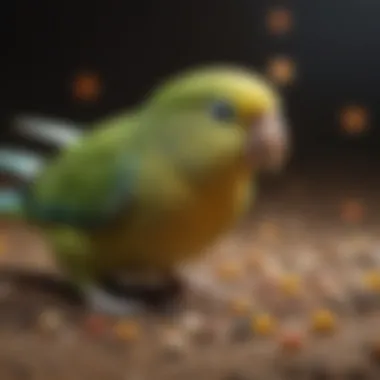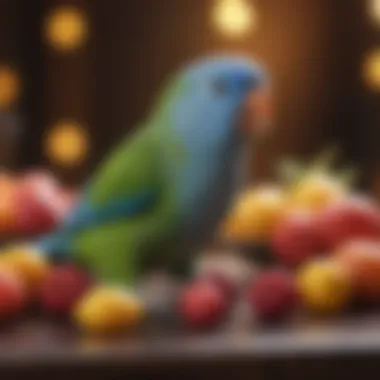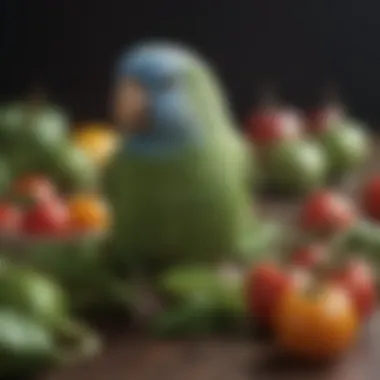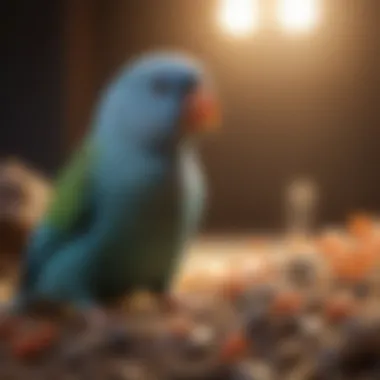Best Food for Parrotlets: A Comprehensive Guide


Intro
Feeding your parrotlet a healthy and balanced diet is crucial for their overall well-being. Understanding what to feed them can be a challenge for new parrotlet owners. This guide will help clarify the dietary needs of these small, lively birds, enabling owners to make informed choices. Parrotlets may be small, but they require a diet rich in essential nutrients. This guide will explore the best food options, how to avoid common pitfalls, and how to incorporate a variety of foods into their daily routine.
Understanding Your Pet
Pet Behavior Basics
Parrotlets are known for their energetic and curious nature. They tend to be playful and social; thus, they require mental and physical stimulation. Understanding their behavior aids in creating an environment that supports their well-being and encourages certain feeding practices. They often mimic sounds and need interaction with their owners for emotional health.
Common Breed Characteristics
Different breeds of parrotlets exhibit unique traits. For example, the Pacific parrotlet is known for its vibrant colors and outgoing personality, while the Yellow-faced parrotlet is often more reserved. Recognizing these characteristics can help owners tailor their care and feeding strategy to the specific needs of their bird.
Species-Specific Needs
Parrotlets have specific dietary requirements that distinguish them from other species. Primarily, they need a combination of seeds, fresh fruits, and vegetables. These dietary components promote good health, enhance vibrant feathering, and improve overall mood. Owners should ensure a variety of foods are available to meet all nutritional needs.
Pet Care and Maintenance
Feeding Guidelines
Feeding parrotlets involves a delicate balance. A majority of their diet should consist of high-quality pellets, which provide essential vitamins and minerals. However, seed mixes can complement their diet but should not be the main component due to high-fat content. Fresh fruits like apples and vegetables such as spinach contribute to their nutrient intake. Gradually introducing new foods helps prevent rejection.
Grooming Essentials
Grooming is necessary for maintaining the appearance and health of parrotlets. Regular nail trimming and occasional baths promote cleanliness and comfort. Providing suitable perches is essential for keeping their beaks and feet healthy. Grooming is more than aesthetic; it impacts their overall health.
Hygiene Practices
Maintaining hygiene in and around the bird's cage is vital. Regular cage cleaning minimizes bacteria and keeps their environment safe. Fresh water should be provided daily to maintain hydration and health. It is crucial to monitor the cleanliness of their feeding dishes, as this supports their health and prevents illness.
Training and Development
Basic Commands and Skills
Teaching parrotlets commands can be an enjoyable experience for both the owner and the bird. Start with simple commands like “step-up” to create a bond and establish trust. Use consistent verbal commands and hand signals to promote learning.
Behavioral Training Techniques
Positive reinforcement is the best approach for training parrotlets. Use treats to reward good behavior. This method encourages desired actions and ensures effective learning. Consistency and patience play critical roles in training success.
Addressing Common Behavior Issues
Behaviors such as biting or excessive noise can be common among parrotlets. Owners should address these issues early. Consistent training and providing chew toys may help redirect negative actions. Recognizing triggers for these behaviors is crucial in modifying them effectively.
Health and Wellness
Routine Vet Check-ups
Regular veterinary check-ups are essential for monitoring your parrotlet's health. A veterinarian who specializes in avian care will provide the best recommendations. These check-ups can help catch health issues early and allow for timely intervention.
Vaccination Needs
Vaccinations are important for preventing common illnesses in birds. Consult with a vet to determine the appropriate vaccination schedule. Staying updated with vaccinations increases your bird's resilience against potential health risks.
Recognizing Signs of Illness
Owners must learn to identify signs of illness. Common indicators include changes in appetite, lethargy, or feather plucking. If any suspicious behaviors are observed, consulting a vet promptly is crucial.
Enrichment and Activities
Indoor vs.


Outdoor Activities
Providing both indoor and outdoor activities is beneficial for parrotlets. Indoor games can include foraging toys that stimulate their mind, while outdoor time allows them to explore new environments and socialize. Always supervise outdoor time to ensure safety.
Interactive Toys and Games
Investing in interactive toys encourages mental stimulation. Toys that require problem-solving can keep your parrotlet engaged and entertained. Rotate toys regularly to prevent boredom and maintain interest.
Socialization Opportunities
Parrotlets thrive on social interaction, both with humans and other birds. Allowing them time with family and playmates increases their confidence and reduces anxiety. Socialization can dramatically enhance their quality of life.
Understanding the Nutritional Needs of Parrotlets
Understanding the nutritional needs of parrotlets is essential for their well-being. These small birds have specific dietary requirements that must be met to promote their health and longevity. Nutrition impacts every aspect of their lives, from their energy levels to their overall mood. Many pet owners may not realize the importance of a balanced diet, which can lead to health issues in parrotlets.
What Are Parrotlets?
Parrotlets are small, lively birds that belong to the parrot family. They are often characterized by their vibrant plumage and playful personality. Native to Central and South America, parrotlets are social creatures that thrive in interactive environments. Their size makes them suitable pets for various living situations, yet their care requires understanding their specific needs.
Key Nutritional Requirements
Macronutrients
Macronutrients are the essential components required in larger amounts to support the basic functions of a parrotlet's body. These nutrients include carbohydrates, proteins, and fats. Each serves a unique role:
- Carbohydrates provide energy for daily activities and support metabolism.
- Proteins are crucial for growth, tissue repair, and overall health. They help in the formation of feathers and muscles.
- Fats supply concentrated energy and are important for hormone production.
One key characteristic of macronutrients is their direct influence on a parrotlet's vitality. These nutrients help maintain an optimal weight and physical condition.
Micronutrients
Micronutrients, although needed in smaller quantities, are vital for parrotlet health. They include vitamins and minerals that aid in various bodily functions. Important micronutrients for parrotlets are:
- Vitamins such as A, D, E, and the B complex group play essential roles in the immune system, skin health, and nerve function.
- Minerals like calcium, phosphorus, and magnesium support bone health, muscle function, and metabolic processes.
The significant characteristic of micronutrients is their supporting role in maintaining long-term health. A deficiency can lead to various health problems, making micronutrients a focus in parrot diet planning.
The Role of Natural Diet
The natural diet of parrotlets primarily consists of seeds, fruits, and vegetables. In their natural habitat, they selectively choose foods that provide necessary nutrients. This natural diet influences their behavior and physical condition. Mimicking this diet in captivity is crucial for their health. Incorporating a variety of natural foods ensures a balanced intake of essential nutrients. It encourages natural foraging behavior, which contributes to overall mental stimulation. A good understanding of their natural diet is beneficial for pet owners looking to promote a healthy lifestyle for their parrotlets.
Important Note: A well-rounded diet is more beneficial than relying solely on seed mixes. Variety contributes to better health outcomes for parrotlets.
Best Foods for Parrotlets
When it comes to the health and vitality of parrotlets, diet plays a crucial role. Selecting the right foods can ensure that these small birds thrive and remain active. Understanding the best food choices goes beyond merely satisfying hunger; it involves meeting their nutritional needs, supporting their immune systems, and promoting overall well-being. As responsible pet owners, we must explore options that provide essential vitamins and minerals, while also considering the preferences of our feathered companions. This guide will dive into the various food types ideal for parrotlets, providing clarity on their benefits and how to integrate them into daily feeding routines.
High-Quality Seed Mixes
Types of Seeds
Seeds can form a significant part of a parrotlet's diet. Various types of seeds fall into two categories: basic seeds, such as millet and canary seed, and specialty seeds, like hemp and sunflower seeds. High-quality seeds are rich in fats, proteins, and carbohydrates. They offer energy and satisfy natural foraging behaviors. Notably, seeds should not be the sole component of their diet due to their high-fat content. Thus, it is essential to combine them with other food types to attain a balance.
Good seed mixes generally contain a variety of seeds to provide a broader range of nutrients. A mixture of different seeds also allows parrotlets to enjoy different tastes and textures, promoting engagement during feeding times.
Choosing the Right Mix
Selecting the right seed mix is vital for the optimal health of parrotlets. A good quality brand should contain a balanced variety relevant to their nutritional needs. Always avoid generic or low-quality mixes, as they may lack essential vitamins and minerals. Look for seed mixes that have additional ingredients, such as dehydrated fruits and vegetables. These ingredients elevate the nutritional value, offering benefits beyond just seeds alone.
It is wise to periodically evaluate how your parrotlet reacts to their chosen mix, as individual preferences and health requirements may vary. For example, observing for signs of overconsumption can guide owners to refine their choices over time.
Pelleted Diets
Benefits of Pellets


Pelleted diets offer a convenient and nutritionally complete option for parrotlet owners. Formulated to provide balanced nutrients, these diets minimize the chances of selective feeding, a common issue with seed mixes. Parrotlets can be picky eaters, often consuming only their favorite seeds while ignoring others. Pellets address this challenge by ensuring that each bite contains essential nutrients required for health.
The compact form encourages chewing, which helps maintain beak health. Moreover, a pelleted diet can be easier to measure and manage, allowing pet owners to have better control over their parrotlet’s food intake.
Recommended Brands
Choosing the right brand of pellets is critical to your parrotlet's nutrition. Popular brands include Harrison's Bird Foods and Zupreem. Each of these comes with unique formulations designed to support different life stages and health needs. It is important to examine the ingredient list, ensuring that high-quality ingredients are at the forefront.
Always introduce new pellets gradually. Sudden changes can upset the bird's digestive system. Monitoring their response to new pellets can help in deciding which choice is best suited to individual birds.
Fresh Fruits and Vegetables
Best Fruits for Parrotlets
Introducing fresh fruits to a parrotlet's diet can enhance their nutritional intake. Fruits such as apples, pears, and berries are particularly beneficial due to their vitamins and hydration properties. These options provide essential fiber, promoting digestive health.
It is vital to ensure that any fruit given is pesticide-free. Washing them thoroughly before offering is a good practice. Monitoring portion sizes is also important, as fruits provide sugars that should not dominate their diet.
Essential Vegetables
Vegetables are equally important elements of a parrotlet's meal plan. Options like carrots, spinach, and bell peppers are rich in nutrients like Vitamin A, which supports vision and immune function. Fresh, chopped vegetables can be offered daily, catering to their freshness preference.
Variety is key. Rotating the available vegetables can keep the diet interesting for parrotlets and prevent boredom. Ensure vegetables are chopped into small pieces to make it easier for your pet to eat.
A diverse diet with a mix of seeds, pellets, fruits, and vegetables can significantly enhance your parrotlet's overall health and happiness.
Supplements and Treats
It is important to consider supplements and treats when planning a diet for parrotlets. While a balanced diet includes various seeds, fruits, and vegetables, these additions can enhance overall nutrition. They provide essential nutrients that may not be fully available in regular foods. In this section, we explore two key areas: nutritional supplements and healthy treat options. Both contribute significantly to a parrotlet's health and happiness.
Nutritional Supplements
Vitamins and Minerals
Vitamins and minerals play a key role in parrotlets' health. They support many bodily functions, including growth, feather development, and immune system strength. Common vitamins include A, D, and E, which help sustain overall well-being. When added to their diet, these nutrients can prevent deficiencies and ensure optimal health.
The use of vitamins and minerals is beneficial due to their concentrated nature. They can fill gaps in the diet, especially if your parrotlet tends to be selective with their food. However, it is critical to monitor dosage, as excess intake can lead to toxicity. Choose high-quality supplements to ensure your parrotlet receives all essential nutrients without harmful additives.
Аmino Acids
Amino acids are another essential component in the diet of parrotlets. These building blocks of protein are crucial for various bodily functions. They support muscle growth, aid in feather production, and promote overall vitality. Notably, some amino acids, such as lysine and methionine, cannot be produced by the body and must be obtained through diet or supplements.
Including amino acids enhances the quality of the diet. They help in recovery from infections and support the creation of antibodies. However, much like vitamins, balancing the intake of amino acids is necessary. Too much can lead to an unbalanced diet. When selecting amino acid supplements, ensure they are specifically designed for birds to maximize benefits.
Healthy Treat Options
Commercially Available Treats
Commercially available treats can add variety and enjoyment to a parrotlet's diet. These products often contain a blend of seeds, fruits, and nuts designed to be highly palatable. They can encourage foraging behavior, which is essential for mental stimulation in these birds. Many of these treats are fortified with vitamins and minerals, which can further support nutritional needs.
However, caution is required; not all commercial treats are created equally. Some might contain preservatives or added sugars that can be detrimental to health. It is essential to read ingredient labels and select high-quality treats that align with the dietary needs of parrotlets. Moderation is also key to prevent overindulgence.
Homemade Treats
Homemade treats offer a wonderful way to customize snacks for parrotlets. They allow control over ingredients, ensuring that only fresh and nutritious components are used. Common options include small pieces of fruits, vegetables, and whole grains. This can also be a delightful bonding experience for owners and their birds.
The unique feature of homemade treats is flexibility; you can create various flavors and textures to suit your parrotlet's preferences. But there are some drawbacks. It requires time and effort to prepare, and there is a risk of unbalanced nutrition if treats are not properly formulated. It's important to incorporate these treats thoughtfully while balancing the overall diet.
Feeding Guidelines for Parrotlets
Feeding guidelines are essential for ensuring the proper health and well-being of parrotlets. These birds are small, yet they have specific dietary needs that must be met to flourish. Understanding how to feed them correctly can significantly impact their longevity and quality of life. A well-structured diet helps prevent nutritional deficiencies, obesity, and various health problems.
Moreover, feeding guidelines can help create a routine that makes it easier for pet owners to manage their parrots’ diets. This includes the types and amounts of food, along with when to feed. It is crucial to establish good feeding practices to foster a healthy habitat for these vibrant birds.


Daily Feeding Recommendations
A parrotlet’s diet should be diverse, comprising various food types. Generally, a diet for a parrotlet should include high-quality seed mixes, pellets, fresh fruits, and vegetables. How much food to give is a key question. On average, each parrotlet requires about one to two tablespoons of food daily, adjusted for specific needs and activity levels.
- Seed Mixes: Approximately 70% of their diet can be composed of mixed seeds. High-quality brands are preferred.
- Pellets: About 20% should consist of pellets designed specifically for parrotlets. They contain balanced nutrients.
- Fresh Produce: The remaining 10% should be fresh fruits and vegetables. Rotate these regularly to maintain interest.
It is important to observe individual preferences and adjust quantities accordingly. Not all parrotlets have the same feeding habits.
Establishing a Feeding Schedule
Setting a consistent feeding schedule can enhance the health of your parrotlet. Birds thrive on routine, and knowing when to expect food can help reduce anxiety. Most parrot owners prefer two feeding times during the day, once in the morning and once in the evening.
- Morning Feeding: During this time, giving the main food portion, such as seed mix and pellets, allows parrotlets to start their day with energy.
- Evening Feeding: In the evening, providing fresh fruits and vegetables can be a nutritious way to conclude the day.
Make sure to remove any uneaten food after a few hours to prevent spoilage, as fresh food can attract unpleasant bacteria. A clean feeding area is vital for maintaining good health. Regular changes also apply to water—fresh water should always be available.
Regular routines not only ensure proper nutrition but also contribute to the overall happiness and well-being of parrotlets, fostering stronger bonds between the pet and owner.
By adhering to these feeding guidelines, parrotlet owners can provide a healthy and balanced diet that enhances the longevity and quality of life for their feathered companions.
Common Dietary Mistakes to Avoid
Understanding common dietary mistakes is essential for maintaining the health of parrotlets. A balanced diet is pivotal for these small birds, which means recognizing what not to do is just as important as knowing what to include in their meals. Many pet owners may unknowingly misstep in their feeding practices, leading to health issues and poor well-being for their feathered companions. Here, we delve into the three most prevalent dietary mistakes: overdependence on seeds, ignoring fresh food offerings, and neglecting water quality. Each mistake carries significant implications for a parrotlet's nutrition and overall health.
Overdependence on Seeds
Parrotlets often display a strong preference for seeds, which can result in owners offering them as the primary food source. However, relying almost entirely on seeds is detrimental. Seeds, while enjoyable for the birds, typically lack many essential nutrients needed for a balanced diet. Most seed mixes are high in fat, which can lead to obesity and associated health problems.
To cultivate a well-rounded diet, introduce a variety of foods alongside seeds. Consider adding pellets, fresh fruits, and vegetables. This approach ensures that parrotlets receive a spectrum of vitamins and minerals necessary for their growth and vitality.
Key Points to Note:
- Seeds should be part of a broader diet, not a sole source of nutrition.
- Fatty seeds can lead to obesity in parrotlets.
- Supplement seed intake with pellets and fresh produce.
Ignoring Fresh Food Offerings
Many parrotlet owners underestimate the importance of providing fresh fruits and vegetables daily. Fresh food is crucial for hydration and offers vitamins that are absent in commercial seed mixes. Ignoring these food options can lead to deficiencies and illnesses in parrotlets.
Daily fresh offerings should include a mix of safe fruits and vegetables. Options like apples, carrots, and leafy greens can enhance a parrotlet's diet dramatically. Resistance to new foods is common, so gradual introduction is recommended. Experiment with different varieties to find which ones the bird enjoys, ensuring a balanced intake.
Important Considerations:
- Fresh produce should comprise a significant portion of their diet.
- Introduce new foods gradually.
- Regular rotation of fruits and vegetables can prevent boredom and encourage healthy eating habits.
Neglecting Water Quality
Water quality is often overlooked in discussions about avian diets. Clean, fresh water is necessary for any pet, but parrotlets are especially vulnerable to bacteria and contaminants. Stale or dirty water can lead to various health problems, including gastrointestinal issues.
It is important to change the water daily. Regular cleaning of the water dish prevents the growth of harmful microorganisms. Providing clean, fresh water supports hydration and ensures that parrotlets remain healthy and active.
Best Practices:
- Change water daily to maintain freshness.
- Clean the water dish frequently to avoid contamination.
- Ensure water is at room temperature before offering it to your bird.
Maintaining awareness of these common dietary mistakes is critical for ensuring your parrotlet's long-term health. Addressing these issues will provide a solid foundation for a vibrant life. Prioritizing a balanced diet and quality care can make all the difference.
Epilogue: A Balanced Diet for a Healthy Life
In the quest to ensure the health and happiness of parrotlets, understanding the significance of a balanced diet cannot be overstated. A well-structured diet forms the foundation for a bird’s overall well-being, influencing their energy levels, appearance, and behavior.
A balanced diet for parrotlets includes a variety of food sources. This not only caters to their nutritional requirements but also keeps them engaged and stimulated. Offering a mix of seeds, pellets, fresh fruits, and vegetables helps to provide the necessary macronutrients and micronutrients, crucial for their growth and longevity.
Key elements to consider include:
- Diverse Food Sources: Incorporating a variety of foods ensures that your parrotlet receives an array of vitamins and minerals. For example, different fruits like apples and bananas contribute unique nutrients that are essential for their health.
- Avoiding Monotony: Feeding the same food repeatedly can lead to nutritional deficiencies. Rotation of treats and fresh options can enhance their experience and health.
- Water Quality: Freshwater is often overlooked but is equally important as their diet. Always provide clean, filtered water to maintain hydration and good health.
The benefits of a balanced diet extend beyond mere nutrition. Parrotlets are intelligent creatures that thrive on mental stimulation. A varied diet can stimulate their interest and reduce boredom. This, in turn, can minimize behavioral issues often caused by lack of engagement.
“A bird's diet is not just about filling the stomach, but fostering a lifestyle that supports both physical and mental health.�”
Moreover, pet owners should remain cautious of common dietary mistakes. Overdependence on seed mixes or commercial pellets can be harmful. Ensuring that their diet mirrors their natural feeding habits in the wild can promote healthy living.







